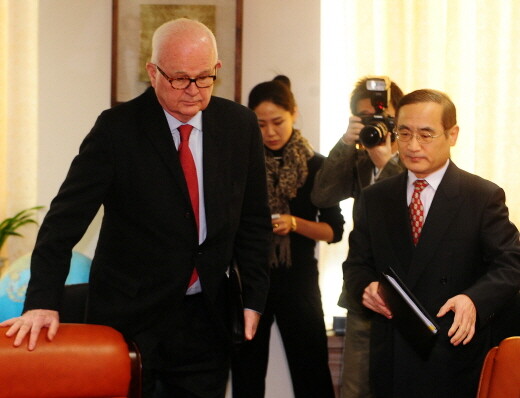hankyoreh
Links to other country sites 다른 나라 사이트 링크
Bosworth and N. Korea to find common ground in denuclearization and a peace agreement

Stephen Bosworth, U.S. special representative for North Korea policy, is scheduled to arrive in North Korea on Tuesday, via Osan Air Base, for a three-day, two-night visit. This will mark the first formal dialogue between North Korea and the U.S. since the Barack Obama administration took office.
The Foreign Ministry reported that prior to the visit, Bosworth met Monday with Wi Sung-lac, South Korean special representative for Korean Peninsula peace and security affairs, and Kim Sung-hwan, senior secretary to President Lee Myung-bak for security and foreign affairs, to discuss the agenda for the North Korea-U.S. bilateral dialogue and directions for response. In addition, the Foreign Ministry says Bosworth will be meeting North Korean First Deputy Foreign Minister Kang Sok-ju.
Bosworth’s visit is significant as a potential turning point for negotiations on the North Korea nuclear issue, which have entered a stalemate following North Korea’s April 5 long-range rocket launch, its second nuclear test on May 25, and resulting sanctions from the international community. However, based on formal remarks from both sides to date, observers are saying that the two sides are tensely opposed in their positions and that it is difficult to expect much in the way of results from this dialogue.
To begin with, the U.S. is adhering to a policy of using Bosworth’s visit to urge North Korea to return to six-party talks and fulfill its part of the September 19, 2005 Joint Statement of the Fourth Round of the Six-Party Talks. Under this policy, actual negotiations are expected to take place through the six-party talks framework, and the current visit provides a limited setting for hearing North Korea’s views.
In contrast, North Korea appears to be placing priority on using a bilateral meeting with the U.S. to turn hostile North Korea-U.S. relations into peaceful ones. The Choson Sinbo newspaper, newspaper of the pro-Pyongyang General Association of Korean Residents in Japan, said Saturday, “In light of past experience, if the parties blindly rush into multilateral talks without preparation, there is a great likelihood no conclusion will be reached.” The newspaper also said, “In order to guarantee peace on the Choson [Korean] Peninsula, Choson [North Korea] and the U.S. must first go through the process of bringing an end to hostile relations.”
In the larger scheme of things, there is no disagreement within the U.S. government that would make it impossible to induce North Korea’s denuclearization without discussions of normalizing North Korea-U.S. relations or forming a peace agreement. If denuclearization is one side of the coin, this view holds, diplomatic compensation or the guarantee of military security represents the other side.
On Nov. 19, U.S. Secretary of State Hillary Rodham Clinton said that if North Korea pursued verifiable denuclearization, then the normalization of U.S.-North Korea relations, the signing of a peace agreement to take the place of the cease-fire agreement and economic aid could all be examined as options. In essence, it is a matter of “sequence and combination.”
In connection with this, the U.S. and South Korean governments are known to be concerned that too much emphasis on discussions toward a peace agreement in the early stages of negotiations could blur the focus on North Korea’s denuclearization and generate a backlash in public opinion. Experts are predicting that the success of these talks will ultimately hinge on how North Korea’s denuclearization measures are combined in sequence with a corresponding normalization of diplomatic relations and a peace agreement.
Interest is also focusing on what results North Korea and the U.S. will produce on plans for future bilateral talks and employment of the six-party talks framework. Experts are making the cautious prediction that a likely scenario would involve holding six-party talks following one more round of North Korea-U.S. talks. They say that there is a strong chance following Bosworth’s visit that bilateral North Korea-U.S. talks could proceed side by side with the six-party talks.
Please direct questions or comments to [englishhani@hani.co.kr]
Editorial・opinion
![[Column] Has Korea, too, crossed the Rubicon on China? [Column] Has Korea, too, crossed the Rubicon on China?](https://flexible.img.hani.co.kr/flexible/normal/500/300/imgdb/original/2024/0419/9317135153409185.jpg) [Column] Has Korea, too, crossed the Rubicon on China?
[Column] Has Korea, too, crossed the Rubicon on China?![[Correspondent’s column] In Japan’s alliance with US, echoes of its past alliances with UK [Correspondent’s column] In Japan’s alliance with US, echoes of its past alliances with UK](https://flexible.img.hani.co.kr/flexible/normal/500/300/imgdb/original/2024/0419/2317135166563519.jpg) [Correspondent’s column] In Japan’s alliance with US, echoes of its past alliances with UK
[Correspondent’s column] In Japan’s alliance with US, echoes of its past alliances with UK- [Editorial] Does Yoon think the Korean public is wrong?
- [Editorial] As it bolsters its alliance with US, Japan must be accountable for past
- [Guest essay] Amending the Constitution is Yoon’s key to leaving office in public’s good graces
- [Editorial] 10 years on, lessons of Sewol tragedy must never be forgotten
- [Column] A death blow to Korea’s prosecutor politics
- [Correspondent’s column] The US and the end of Japanese pacifism
- [Guest essay] How Korea turned its trainee doctors into monsters
- [Guest essay] As someone who helped forge Seoul-Moscow ties, their status today troubles me
Most viewed articles
- 1[Column] The clock is ticking for Korea’s first lady
- 2Hong Se-hwa, voice for tolerance whose memoir of exile touched a chord, dies at 76
- 3After 2 months of delayed, denied medical care, Koreans worry worst may be yet to come
- 4[Column] Has Korea, too, crossed the Rubicon on China?
- 5US overtakes China as Korea’s top export market, prompting trade sanction jitters
- 6Samsung barricades office as unionized workers strike for better conditions
- 7All eyes on Xiaomi after it pulls off EV that Apple couldn’t
- 8[Correspondent’s column] In Japan’s alliance with US, echoes of its past alliances with UK
- 975% of younger S. Koreans want to leave country
- 10[Correspondent’s column] The US and the end of Japanese pacifism